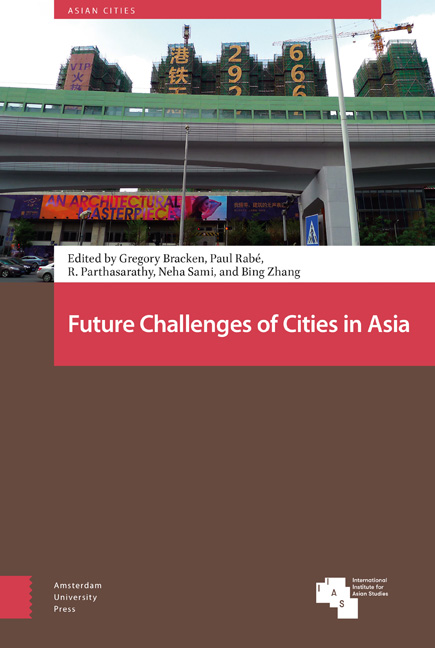Book contents
- Frontmatter
- About the Three UKNA Volumes
- Contents
- List of Figures and Tables
- 1 Future Challenges of Cities in Asia: An Introduction
- 2 Human Agency in the Asian City
- 3 Toward Inclusive, Vital and Livable City Scenarios: The Transformation of Urban Villages in Shenzhen
- 4 Cultural Dilemma in Beijing's Urban Regeneration: From Liulichang Cultural Street to Qianmen Street and Yangmeizhu Oblique Street
- 5 Housing as Heritage: The Great Urban Dilemma of the Global City of Shanghai
- 6 Not an Act of God: Lessons from a Disaster in the Settlements Planning of a River City
- 7 The Political Ecology of Climate Injustice in Bangkok
- 8 Assessing Flood-Related Vulnerability of the Urban Poor
- 9 The Ecological Future of Cities: Evaluating the Role of Green Infrastructure in Promoting Sustainability/Resilience in India
- 10 Hong Kong's “Rail-plus-Property” Development: A Model for Financing Public Transportation in Developing Cities in Southeast Asia?
- 11 Large Infrastructure Projects: The Emergence of Corridors in Asia
- Index
- Publications / Asian Cities
11 - Large Infrastructure Projects: The Emergence of Corridors in Asia
Published online by Cambridge University Press: 21 November 2020
- Frontmatter
- About the Three UKNA Volumes
- Contents
- List of Figures and Tables
- 1 Future Challenges of Cities in Asia: An Introduction
- 2 Human Agency in the Asian City
- 3 Toward Inclusive, Vital and Livable City Scenarios: The Transformation of Urban Villages in Shenzhen
- 4 Cultural Dilemma in Beijing's Urban Regeneration: From Liulichang Cultural Street to Qianmen Street and Yangmeizhu Oblique Street
- 5 Housing as Heritage: The Great Urban Dilemma of the Global City of Shanghai
- 6 Not an Act of God: Lessons from a Disaster in the Settlements Planning of a River City
- 7 The Political Ecology of Climate Injustice in Bangkok
- 8 Assessing Flood-Related Vulnerability of the Urban Poor
- 9 The Ecological Future of Cities: Evaluating the Role of Green Infrastructure in Promoting Sustainability/Resilience in India
- 10 Hong Kong's “Rail-plus-Property” Development: A Model for Financing Public Transportation in Developing Cities in Southeast Asia?
- 11 Large Infrastructure Projects: The Emergence of Corridors in Asia
- Index
- Publications / Asian Cities
Summary
Abstract
Asia is witnessing a substantial increase in large-scale infrastructure projects, often in the form of regional corridors. In this chapter, we analyze the emergence of corridors in Asia and attempt to place it within the economic, political, and social contexts within which this emergence is taking place. We delineate the key characteristics of Asian corridors and examine cases of Japan, India, and Malaysia to draw out their common characteristics. We argue that corridors are spatial forms seeking to integrate regions by transcending existing political and economic boundaries while remaining tied to a particular set of economic objectives. In our conclusion, we argue that in order for corridors to effectively integrate regions, the objectives of corridor planning need to be broadened.
Keywords: corridors, Asia, infrastructure, planning, regions, economy
Introduction
An examination of the spatial and economic landscape in Asia reveals that the continent is witnessing a substantial increase in large-scale infrastructure projects, often specifically in the form of regional corridors. These corridors are typically planned industrial, economic, or infrastructure projects, covering large geographical areas, often spanning national borders. They often focus on improving economic growth, trade, and industry and are strongly linked to the economic plans and strategies of their host nations.
Corridors have become ubiquitous in Asia. The Asian Development Bank (ADB) is funding a series of corridors that spans across China, Myanmar, Vietnam, Thailand, Cambodia, and Laos under its Greater Mekong Sub- Region Economic Co-operation Program (Asian Development Bank 2016). In Central Asia, a series of corridors are being planned under the Central Asian Regional Economic Co-operation (CAREC) program, presumably to improve trade and industrial links between Central Asian nations, while acting as conduits between East Asia and Europe (Asian Development Bank 2014). Malaysia already has a series of industrial corridors while India is currently developing a similar set within its national borders, linking major urban centers such as Delhi and Mumbai. More recently, the People's Republic of China embarked on an ambitious project called One Belt One Road (OBOR) or the Belt and Road Initiative (BRI) that seeks to capitalize on the historical Silk Road network as well as linking major seaports along Asian coastlines (Rolland 2015). The government of Japan has even proposed a “peace corridor” in the Middle East, involving Israel, Palestine, and Jordan, to promote regional co-operation (Ministry of Foreign Affairs of Japan 2006).
- Type
- Chapter
- Information
- Future Challenges of Cities in Asia , pp. 277 - 298Publisher: Amsterdam University PressPrint publication year: 2019



